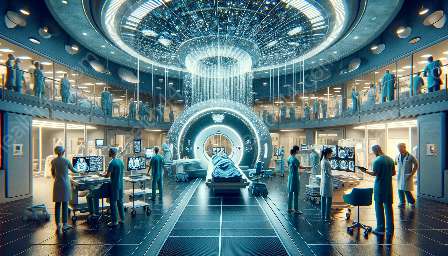In today's world, lifestyle choices play a significant role in shaping health outcomes. It has become increasingly important to understand the impact of various lifestyle factors on our well-being. From diet and exercise to stress management and environmental exposures, these elements significantly influence our health.
Medical imaging, in conjunction with advanced image processing technologies, has revolutionized our ability to comprehend how lifestyle choices affect our health. By providing detailed insights into the body's internal structures and functions, medical imaging enables healthcare professionals and researchers to assess the physiological effects of different lifestyles and make informed decisions regarding patient care and public health strategies.
Role of Medical Imaging in Assessing Lifestyle-related Health Effects
Medical imaging encompasses a broad spectrum of modalities, including X-rays, computed tomography (CT), magnetic resonance imaging (MRI), ultrasound, and molecular imaging. Each modality offers unique capabilities to visualize various aspects of the human body, making it possible to study the effects of lifestyle on different physiological systems.
Visualizing Cardiovascular Health
Cardiovascular diseases are closely linked to lifestyle factors such as physical activity, diet, and smoking. Medical imaging techniques, particularly MRI and CT angiography, allow for the detailed assessment of cardiac anatomy, blood flow, and plaque buildup in the arteries. By visualizing these aspects, healthcare professionals can identify the impact of lifestyle choices on cardiovascular health and tailor interventions accordingly.
Assessing Bone Health and Physical Activity
Physical activity and nutrition significantly influence bone health. DEXA scans and other imaging modalities are used to assess bone mineral density and identify conditions such as osteoporosis. These insights help in understanding the effects of lifestyle decisions on bone strength and fracture risk.
Implications for Cancer Risk and Prevention
Lifestyle choices, including diet and exposure to environmental factors, can impact cancer risk. Medical imaging plays a crucial role in cancer diagnosis, treatment planning, and surveillance. Techniques like mammography, ultrasound, and positron emission tomography (PET) provide valuable information about tumor characteristics and metabolic activity, contributing to a better understanding of lifestyle-related cancer risks.
Advancements in Medical Image Processing
Medical image processing has further augmented the capabilities of traditional imaging modalities by enabling quantitative analysis, three-dimensional reconstructions, and the extraction of detailed biomarkers. These advancements have paved the way for sophisticated computational techniques that enhance our ability to interpret the impact of lifestyle choices on health.
Quantitative Analysis of Tissue Characteristics
Through image processing algorithms, medical imaging can quantify tissue properties such as density, vascularity, and perfusion. This allows for the assessment of organ function, metabolic activity, and disease progression, providing valuable insights into the effects of lifestyle on tissue physiology.
Virtual Reconstruction and Simulation
By leveraging image processing, medical professionals can create detailed virtual models of anatomical structures and simulate physiological processes. This capability aids in understanding how lifestyle factors influence organ function and pathological changes, offering a comprehensive view of the effects of various habits on health outcomes.
Biomarker Identification and Characterization
Image processing techniques facilitate the identification and characterization of biomarkers associated with lifestyle-related health effects. By analyzing imaging data, researchers can identify specific patterns and markers related to lifestyle choices, furthering our understanding of their impact on health.
Future Implications and Public Health Strategies
The integration of medical imaging and image processing holds promising implications for shaping public health strategies that address lifestyle-related health challenges. By harnessing the wealth of information generated through advanced imaging techniques, healthcare professionals can develop targeted interventions and personalized approaches to promote healthier lifestyles and mitigate the adverse effects of unhealthy habits.
Personalized Medicine and Health Behavior Interventions
Medical imaging, coupled with sophisticated image processing, enables the customization of medical interventions and lifestyle recommendations. By accurately assessing individual variations in physiological responses to lifestyle factors, personalized approaches to disease prevention and health promotion can be tailored, leading to more effective behavioral interventions and improved health outcomes.
Evidence-based Policy Making and Health Promotion
Medical imaging data, processed and analyzed using advanced computational tools, provides evidence-based insights for policymakers and public health authorities. This data-driven approach to understanding the effects of lifestyle on health informs the development of targeted health promotion initiatives, regulations, and interventions aimed at fostering healthier environments and behaviors.
Collaborative Research and Multidisciplinary Approaches
The synergy between medical imaging and image processing encourages interdisciplinary collaborations among healthcare professionals, data scientists, and public health experts. This collaborative approach facilitates comprehensive research endeavors that aim to elucidate the intricate relationships between lifestyle factors and health outcomes, ultimately informing multifaceted strategies to address lifestyle-related health challenges.
Conclusion
Medical imaging, supported by the advancements in image processing technology, plays a pivotal role in unraveling the intricate connections between lifestyle choices and their effects on health. By providing detailed visualizations and quantitative assessments, medical imaging empowers healthcare professionals, researchers, and policymakers to make informed decisions, fostering a deeper understanding of the impact of lifestyle on health. The integration of medical imaging with public health initiatives holds great potential for promoting healthier living and mitigating the adverse effects of unhealthy lifestyles.



